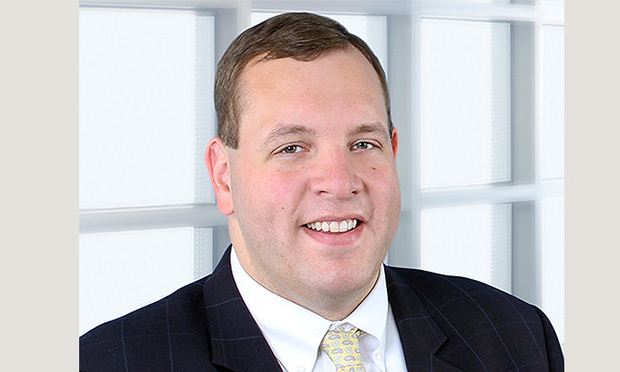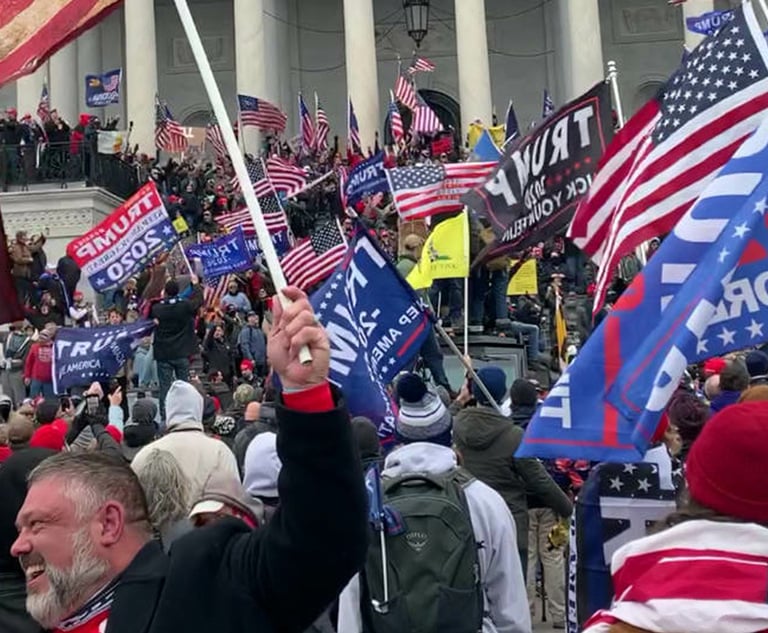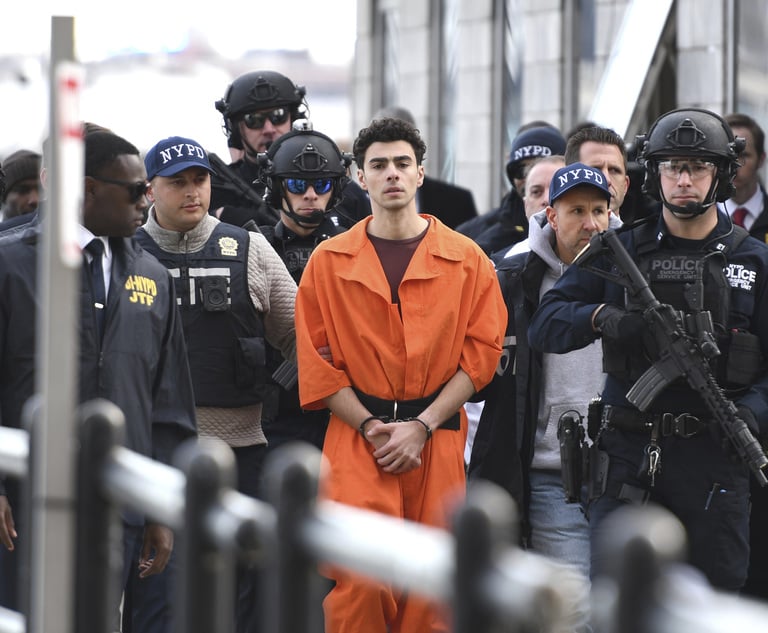How a Big Law Corporate Lawyer Won a New Trial for a Man Convicted of Murder
Attorney John Cordani Jr. scored a major win as he handled his 19th pro bono case: The Connecticut Supreme Court ruled 6-0 Aug. 7 to order a new trial for a convicted murderer.
August 16, 2019 at 09:39 AM
3 minute read
 John Cordani Jr. of Robinson & Cole. (Courtesy photo)
John Cordani Jr. of Robinson & Cole. (Courtesy photo)
A Big Law trial lawyer who focuses on intellectual property cases has won a new trial for a convicted murderer facing dismal odds.
John Cordani Jr. is a member of Robinson+Cole’s business litigation group. He was certainly no novice at pro bono work. He hand defended clients facing charges ranging from breach of peace to murder, when he took on his nineteenth pro bono case in April 2017 on behalf of convicted murderer Eugene Walker.
But the road was long on this case, and the odds weren’t in his client’s favor.
First, Cordani had to face the reality that Walker was convicted of felony murder, first-degree manslaughter with a firearm and criminal possession of a pistol or revolver. And second, prosecutors sought to show his client had committed multiple crimes when he killed Neville Malacai Registe in a parking lot during a 2012 drug deal that went sour.
Cordani, a Robinson+Cole’s Hartford partner since June, had previously worked at McCarter & English. But the business lawyer spent more than 150 pro bono hours on the case, which paid off when the Connecticut Supreme Court unanimously overturned the conviction. Now, his 34-year-old client will get a new trial, based the constitutional ‘confrontation clause,’ a Sixth Amendment provision that gives defendants in criminal cases the right to confront witnesses against them.
The attorney hinged the appeal on an unidentified forensic analyst, who was instrumental in gathering the evidence used to convict Walker.
During the investigation, supervisory forensic analyst Heather Degnan had performed a DNA extraction from a black bandanna that the state said the killer, whom it identified as Walker, had worn. But another analyst, whom the state declined to name, took a swab from Walker’s mouth and then devised a DNA profile from that. That analyst later sent the profile of the swab to Degnan, who compared the sample from the mouth to the one from the bandanna, and concluded that they matched.
Cordani said he knew he’d focus his entire 30-minute oral arguments on one issue.
“The hardest part for me was making sure I showed the justices that cross-examination was useful in these circumstances,” he said. “The U.S. Supreme Court once said that confrontation is the best legal device ever invented to find the truth, and that was so in this case.”
It’s not clear why the state never allowed the analyst to testify. Its lead counsel, Assistant State’s Attorney Timothy Sugrue declined to comment on the case.
But Cordani set out to put the scientist at the center of his arguments.
“I focused on citing case law and scientific material that showed that DNA forensics is not infallible,” he said, adding he studied textbooks to help make his point. “There are all sorts of ways an analyst could make errors, such as mixing the samples up. They can also make a mistake in interpreting the data.”
This content has been archived. It is available through our partners, LexisNexis® and Bloomberg Law.
To view this content, please continue to their sites.
Not a Lexis Subscriber?
Subscribe Now
Not a Bloomberg Law Subscriber?
Subscribe Now
NOT FOR REPRINT
© 2025 ALM Global, LLC, All Rights Reserved. Request academic re-use from www.copyright.com. All other uses, submit a request to [email protected]. For more information visit Asset & Logo Licensing.
You Might Like
View All
‘Undermines the Rule of Law’: Retired US Judges Condemn Trump’s Jan. 6 Pardons

Luigi Mangione Charged in Federal Court for Stalking, Murder and Firearms Offenses

Suspected Shooter of UnitedHealthcare CEO Is Charged With Murder in New York. Now What?

Trending Stories
- 1New York-Based Skadden Team Joins White & Case Group in Mexico City for Citigroup Demerger
- 2No Two Wildfires Alike: Lawyers Take Different Legal Strategies in California
- 3Poop-Themed Dog Toy OK as Parody, but Still Tarnished Jack Daniel’s Brand, Court Says
- 4Meet the New President of NY's Association of Trial Court Jurists
- 5Lawyers' Phones Are Ringing: What Should Employers Do If ICE Raids Their Business?
Who Got The Work
J. Brugh Lower of Gibbons has entered an appearance for industrial equipment supplier Devco Corporation in a pending trademark infringement lawsuit. The suit, accusing the defendant of selling knock-off Graco products, was filed Dec. 18 in New Jersey District Court by Rivkin Radler on behalf of Graco Inc. and Graco Minnesota. The case, assigned to U.S. District Judge Zahid N. Quraishi, is 3:24-cv-11294, Graco Inc. et al v. Devco Corporation.
Who Got The Work
Rebecca Maller-Stein and Kent A. Yalowitz of Arnold & Porter Kaye Scholer have entered their appearances for Hanaco Venture Capital and its executives, Lior Prosor and David Frankel, in a pending securities lawsuit. The action, filed on Dec. 24 in New York Southern District Court by Zell, Aron & Co. on behalf of Goldeneye Advisors, accuses the defendants of negligently and fraudulently managing the plaintiff's $1 million investment. The case, assigned to U.S. District Judge Vernon S. Broderick, is 1:24-cv-09918, Goldeneye Advisors, LLC v. Hanaco Venture Capital, Ltd. et al.
Who Got The Work
Attorneys from A&O Shearman has stepped in as defense counsel for Toronto-Dominion Bank and other defendants in a pending securities class action. The suit, filed Dec. 11 in New York Southern District Court by Bleichmar Fonti & Auld, accuses the defendants of concealing the bank's 'pervasive' deficiencies in regards to its compliance with the Bank Secrecy Act and the quality of its anti-money laundering controls. The case, assigned to U.S. District Judge Arun Subramanian, is 1:24-cv-09445, Gonzalez v. The Toronto-Dominion Bank et al.
Who Got The Work
Crown Castle International, a Pennsylvania company providing shared communications infrastructure, has turned to Luke D. Wolf of Gordon Rees Scully Mansukhani to fend off a pending breach-of-contract lawsuit. The court action, filed Nov. 25 in Michigan Eastern District Court by Hooper Hathaway PC on behalf of The Town Residences LLC, accuses Crown Castle of failing to transfer approximately $30,000 in utility payments from T-Mobile in breach of a roof-top lease and assignment agreement. The case, assigned to U.S. District Judge Susan K. Declercq, is 2:24-cv-13131, The Town Residences LLC v. T-Mobile US, Inc. et al.
Who Got The Work
Wilfred P. Coronato and Daniel M. Schwartz of McCarter & English have stepped in as defense counsel to Electrolux Home Products Inc. in a pending product liability lawsuit. The court action, filed Nov. 26 in New York Eastern District Court by Poulos Lopiccolo PC and Nagel Rice LLP on behalf of David Stern, alleges that the defendant's refrigerators’ drawers and shelving repeatedly break and fall apart within months after purchase. The case, assigned to U.S. District Judge Joan M. Azrack, is 2:24-cv-08204, Stern v. Electrolux Home Products, Inc.
Featured Firms
Law Offices of Gary Martin Hays & Associates, P.C.
(470) 294-1674
Law Offices of Mark E. Salomone
(857) 444-6468
Smith & Hassler
(713) 739-1250










